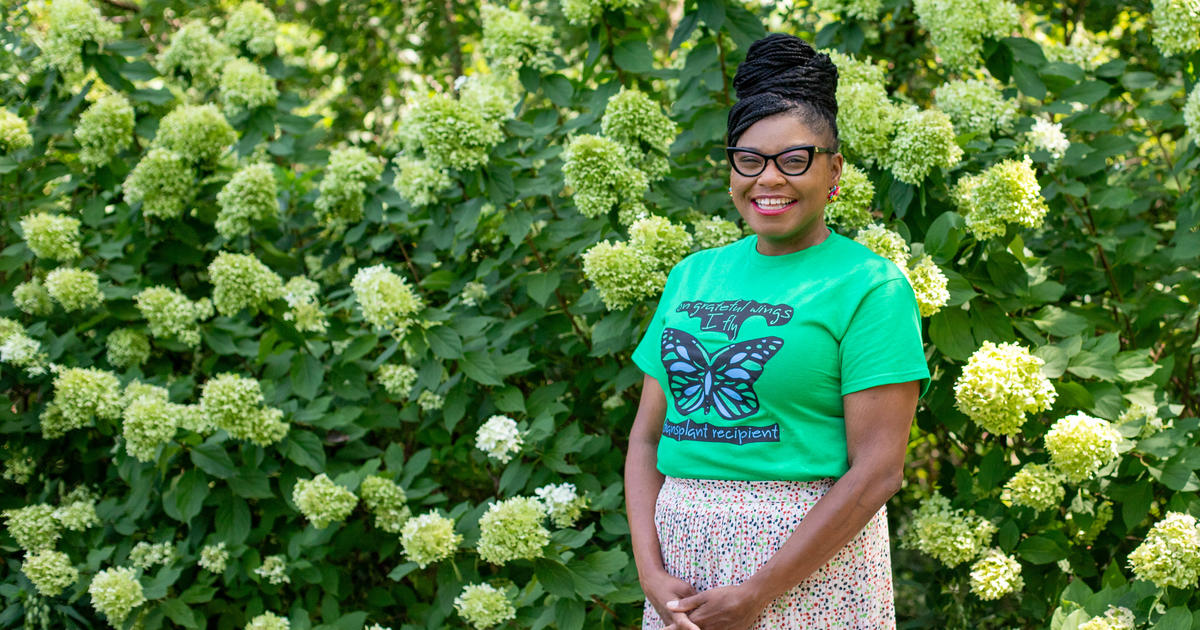UK kidney transplant transforms pain into purpose

LEXINGTON, Ky. (Aug. 30, 2024) – Lexington resident Ashley Holt has a favorite scripture from the Bible, one that she goes back to repeatedly when she needs to gather her thoughts and make sense of her journey. Jeremiah 29:11 is like a mantra and appears to her serendipitously in unexpected places just when she needs it most.
“For I know the plans I have for you,” declares the Lord, “plans to prosper you and not to harm you, plans to give you hope and a future.”
It was hard for her to understand what that plan was in 2020, when she was diagnosed with end-stage kidney failure. After accepting the reality of her diagnosis, she started on a new path with determination, patience and self-actualization until she reached her destination: a life-saving kidney transplant. But little did she know, her path continued and she continues to discover new phases of that plan every day.
‘I was tired all the time.’
Ashley’s early symptoms were the kind that were easy to ignore or explain away. She was a single mom to daughter Niyah, working full-time while also pursuing her doctoral degree. The exhaustion she experienced could be attributed to overextending herself, saying “yes” to every favor and request and never taking time rest.
“I was tired all the time,” Ashley said. “I would miss meals, but thinking it was because I was so busy. I would take naps during my lunch break.”
So she made some changes. She exercised more, worked with a nutritionist to make better food choices and tried to get more sleep. Nothing worked. In fact, she felt worse than ever.
“I was constantly thirsty,” she said. “I would get a cold that would last for weeks. My whole body hurt. Food tasted like metal. I would sit in my car when it was 80 or 90 degrees out, with the windows up and my heated seats on because I was too cold to drive home.”
Ashley believes “health is wealth” and had always been diligent about regular wellness exams with her primary care provider. Her routine labs showed nothing too irregular. It wasn’t until her persistent symptoms landed her in the hospital did the topic of her kidneys come up. What started as a gradual decline in function quickly turned into a steep descent. Kidney function is measured in percentage, with 100% being fully functional. Ashley’s measured at 14%, before suddenly dropping again to just 6%.
She recalls the shock of being told she was in end-stage renal failure just as abrupt as her physical decline. She didn’t have the luxury of mentally preparing herself for the disease’s progression from stage 1 onward; she was already in stage 5. Dialysis was next, followed by an evaluation for a kidney transplant. Burdened with the grim news, she knew her life, her daughter’s life, her professional and personal life were about to be upended. Looking back, Ashley knows she should have taken the time to process her diagnosis. Instead, she faced the news with matter-of-fact approach.
“I faked it,” she said. “I kept a straight face like I was at a strategic planning meeting, asking questions and looking at the pamphlets they gave me, but inside, I’m dying. I left the appointment, head held high, on my way to give a talk at my daughter’s school. But then I got back to my car, called my mom and cried and cried.”
This was in 2020, when the world was shutting down. As people retreated into their homes during lockdown, using the time to learn new skills and pick up new hobbies, Ashley decided it was an opportunity to focus on herself.
“I had just left a job of 15 years, and just took that time as a pause to deal with my health,” she said. “I put myself into learning about my condition, available treatments and policy and advocacy related to transplant. When people were using that time for ‘becoming,’ I was ‘unbecoming.’ I took that time to unbecome the Ashley who was on a huge career trajectory to the Ashley who slowed down and believed that health is wealth.”
‘Unbecoming’ Ashley
Ashley embraced her new normal. She paid attention to her body, focusing on how she felt after she ate certain foods or engaging in physical activity. She also learned how to say ‘no.’
“I came to the realization that my time could possibly be limited,” she said. “I wanted to be in the best condition for my daughter and not miss out on the things she was doing.”
Ashley started peritoneal dialysis, a type of dialysis she could do at home. Because the procedure takes 10 hours, she gave herself permission to ask for help when she needed it. It was all part of her “unbecoming,” and learning that she’s not a burden to the people who love her and want to help her get well.
“Before I was a chameleon, being whatever people needed,” she said. “During the unbecoming, I had none of that. It was a relief because I was so much better for the people around me. And I could be my authentic self around my daughter.”
But paths to progress are never a straight line. Ashley was frustrated. She launched a campaign to find a living donor, but no one in her circle was a suitable match. She learned during her research that there are many genetic factors to matching a kidney donor with a recipient. Transplants tend to work better when both parties are from a similar genetic background, and the pool of suitable donors for Ashley was very small.
But she knew there were plans for her. She started a new job as the diversity, equity and inclusion regional manager for Bluegrass Care Navigators (BCN), educating people of diverse backgrounds on the importance of making plans for end-of-life care, while also making those plans for herself. Both through her profession and personal experience, she knew what questions to ask her providers, how to have the difficult conversations with family members and how the end-of-life is an opportunity to leave a legacy.
“But what about the others who don’t have that support, the education, the awareness, the confidence, the courage?” she said. “I show them I’m the young Black woman with chronic kidney disease, who had to discuss my wishes with my family because I don’t know if my next hour is promised. So that opened a lot of eyes. I share that I have these plans and make sure people understand their choices, dispel myths and misconceptions and realize the importance of having the right information.”
While sharing her story, Ashley felt a sense of urgency and frustration. She had been on dialysis for 18 months; she had to be home by a certain time to start her nightly dialysis procedure, so late dinners and movies were off the table. She missed friends’ weddings, trips and experiences in case the call for her new kidney came in.
And then the call finally came.
‘I’m the main chick!’
Every patient on the waiting list for a life-saving transplant lives in both hope and agony for that fateful call. First comes the exhilaration that the wait is over, and a new life can begin. But they understand the call can be a false alarm. Ashley arrived at the hospital, only to find that another patient was a better match for the lone available kidney. She was discouraged, but she took comfort in knowing there was a plan for her.
Two weeks later, on Aug. 21, 2023, the phone rang again. Excited but incredulous, she asked if she was the primary recipient, or secondary like she was last time.
“I said, are you sure I’m the main chick and not the side chick?” she said. “They said it’s real this time, you’re the main chick, and can you be here in 30 minutes? I walked into Chandler Hospital like I was Miss America.”
Ashley’s surgery, performed by Siddharth D. Desai, M.D., went perfectly with no complications. Aside from a slight medication change, Ashley’s post-transplant journey has been smooth, and she was excited to embark on the life she had been dreaming about for three years. Now one year out from her surgery and celebrating her 40th birthday, she has a list of 40 things to do, including a long awaited and much deserved trip to Jamaica.
But there is a tinge of sadness in her celebration. Her kidney came from a deceased donor, a name she may never know and a face she will never see. But with her faith, combined with her work in end-of-life care planning, she knows she’s been gifted with a legacy, one that she considers an honor to carry on.
“All I do in this year of an extra life, I do in remembrance of them,” she said. She wears a green charm on her bracelet, the awareness color of chronic kidney disease, as a symbol of the piece of them she carries.
‘For I know the plans I have for you.’
With renewed energy and focus, Ashley uses the story of her journey to affect change throughout the Commonwealth. Through her work with BCN, she helped shape a strategic goal to reach more Black and Latino patients and help them and their families navigate the end-of-life care planning process. She shared her story with policymakers and health care administrators, helping to ensure that Kentuckians across racial, ethnic, socioeconomic and sexual orientation demographics have the resources they need to make informed choices in the face of serious or terminal illness.
“Utilizing my experiences, being the patient, the caregiver and the advocate, I have the chance to educate not just the patients we serve, but my organization,” she said. “I’m a kidney patient for life, so I help patients learn to ask for help, ask for accommodations and know what questions to ask.”
Four years ago, Ashley was a different person — terminally ill, exhausted from being a pillar of strength for her family, frustrated and devastated with her diagnosis. But she trusted there was a plan for her. Now she knows the plan, and she performs her new role proudly. “I used to say, ‘Why do I have this kidney disease?’ And now I say, ‘Why not?’” she said.
She has shown patients across 32 counties in the Commonwealth what courage looks like, and what a difference having knowledge, self-advocacy and perseverance can make.
“I’m the best one for it.”
August is National Minority Donor Awareness Month (NMDAM), a collaborative effort by the National Organ, Eye and Tissue Donation Multicultural Action Group (NMAG) to save and improve the quality of life of diverse communities by creating a positive culture for organ, eye and tissue donation. The national transplant waiting list currently stands at more than 100,000 people, with 60% of those waiting representing racial and ethnic minorities. Seventeen people die every day waiting for a transplant.
Learn more about being an organ donor and the organ donor registry here.
link





